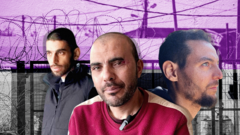Interviews with recent Palestinian detainees released from Israeli custody tell stories of severe mistreatment, including chemical burns and electric shocks, as the Israeli authorities face accusations of systemic abuse. Human rights experts note these practices may constitute torture under international law.
Survivors of Israeli Detention Share Disturbing Accounts of Torture

Survivors of Israeli Detention Share Disturbing Accounts of Torture
Released Palestinian detainees reveal harrowing experiences of torture and abuse during their time in Israeli custody, prompting international scrutiny.
Palestinian detainees released back to Gaza have recounted chilling stories of mistreatment and torture they allegedly suffered while in custody of Israeli military and prison staff. Their testimonies, shared exclusively with BBC, add to the growing documentation of alleged abuse within Israeli detention facilities.
Mohammad Abu Tawileh, a 36-year-old mechanic, detailed horrific experiences, claiming that he was forcibly doused in chemicals, which led to severe burns. “I thrashed around like an animal in an attempt to put the fire out,” he recounted grimly.
The revelations come from in-depth interviews with five men released after being detained under Israel's Unlawful Combatants Law, which allows for the indefinite detention of individuals suspected of posing security threats without charge. These detentions followed escalations in conflict after Hamas's 7 October 2023 attacks, where widespread violence resulted in the deaths of approximately 1,200 individuals in Israel and the hostage taking of 251 others.
Each detainee claimed to have been subjected to physical and psychological abuse, including beating, electric shocks, and humiliation. Noteworthy claims include instances of sexual abuse and threats using deadly dogs. Reports from international law experts indicate that the treatment the detainees described fails to align with human rights standards under international law.
The Israeli Defense Forces (IDF) and Israel Prison Service (IPS) have both denied allegations of systematic abuse, stating they would investigate some claims. However, they did not address specific accusations made by the released men.
One of the detainees, Abdul Karim Mushtaha, described being blindfolded, stripped, and subjected to brutal treatment during his time in custody. “No one would give me a drop of water,” he lamented, illustrating the lack of basic care or humanity during interrogation periods.
The released detainees had initially been held at Sde Teiman, an IDF facility already notorious for abuse claims. Evidence submitted by human rights organizations and lawyers suggests a pattern of violence and mistreatment across multiple detention centers in Israel, with some detainees reporting severe physical injuries as a result of their treatment.
Dr. Lawrence Hill-Cawthorne, legal expert and co-director of the Centre for International Law at the University of Bristol, asserted that such treatment could meet the threshold for torture under both Israeli and international law. The situation further escalates concerns over the general welfare of detainees, with the International Committee of the Red Cross (ICRC) urgently requesting access to all detention facilities.
As the men returned to Gaza to meet their families, their emotional and physical scars left lasting marks. Many expressed a longing to leave the territory due to the trauma of their experiences and the ongoing fear of violence. The accounts from these detainees serve as vital testimonies in the ongoing discourse about human rights violations in conflict situations.




















